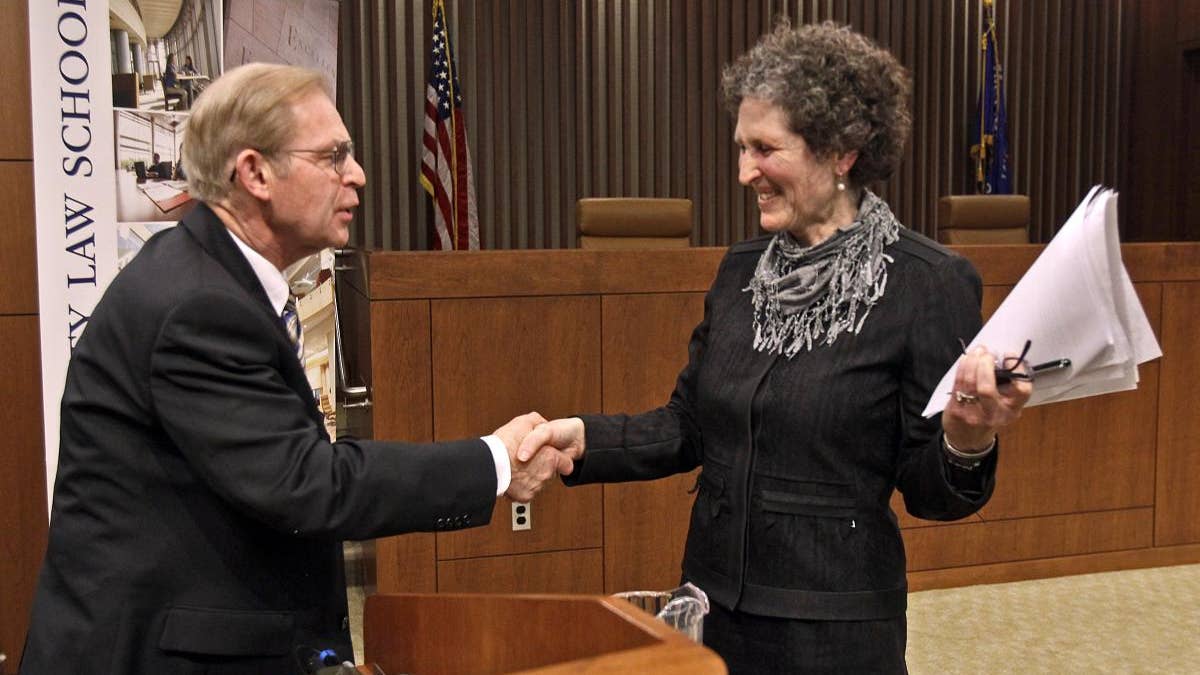
Justice David Prosser shakes hands with Assistant Attorney General JoAnne Kloppenburg after their debate for the Wisconsin Supreme Court at the Marquette University Law School in Milwaukee. (AP Photo/Milwaukee Journal-Sentinel, Benny Sieu)
Wisconsin's Government Accountability Board has begun the tedious task of recounting ballots cast in the state Supreme Court election that saw record turnout earlier this month, but it's the politics behind the first statewide recount in almost 25 years that is an interesting story.
The official vote tally after the April 5 election declared incumbent conservative Justice David Prosser the winner, getting about 7,000 votes more than liberal challenger Joanne Kloppenburg. The recount, which will cost taxpayers about $1 million at a time when the state is struggling financially, is not expected to change anything.
Still Kloppenburg has the right to ask for a recount, and she is. The question is why?
Kloppenburg and her campaign manager repeat that the motivation is to, "verify the outcome and to restore public trust in the electoral process." But Professor David Schultz at Hamline University in neighboring Minnesota argues the recount is a stall tactic, tracing back to Republican Gov. Scott Walker's controversial legislation that curbs negotiating rights for public employees and makes them contribute to their health care coverage and pensions.
"[I]t may work to the advantage of Democrats who want to change the law restricting collective bargaining rights," Schultz says.
State law requires the recount to wrap up by May 9, but officials could ask for an extension if things are slow. Wednesday was the first day of the recount, and WHBL Radio reported that only 500 of the state's 3,600 voting districts reported any results. If the recount drags into August, Prosser would be prevented from starting his new term on the Supreme Court. That would change the power sway in Wisconsin's highest court from a 4-3 conservative majority to a 3-3 draw.
Walker's law, which was muscled through the state legislature and created a national uproar, is currently held up in a circuit court challenge. Republican State Senate Majority Leader Scott Fitzgerald has labeled Dane County Circuit Judge Maryanne Sumi "The poster child for liberal activist judges," and most expect her to rule against the law. The argument over the law is expected to eventually make its way to the state Supreme Court. A 3-3 decision there would mean Sumi's ruling - whatever it is - stands.
Marquette University law professor Richard Esenberg agrees that the recount is a stall tactic, but does not wholly agree with Shultz's reasoning. "My own personal speculation is that the recount may be thought to maintain anger into the recalls," he said, referring to numerous petition drives that have five Republican Senators and three Democrats facing do-over elections either because they supported Walker's legislation or fled the state to prevent its passage.
Esenberg also says the longer it takes for the collective-bargaining law to go into effect, the longer state employees get to play by the old rules. That means union dues collected by the state remain mandatory and employees don't have to contribute to health care and pensions, which could help Democrats.




